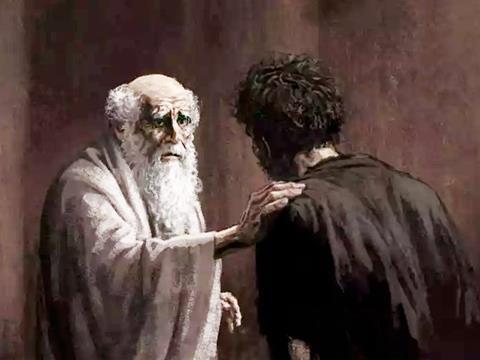After Jerusalem was destroyed in AD70, Judaism could have vanished…but Yohanan ben Zakkai, a rabbi and near contemporary of Jesus, preserved and reshaped Jewish teaching for millennia to follow. David Instone-Brewer explores how his message echoed Jesus’ – but missed the crucial truth at its heart

Modern Judaism was founded by Yohanan ben Zakkai, a brilliant scholar who was born around the time of Jesus, and almost certainly met him. After Jerusalem was destroyed in AD70, Judaism nearly died out as well. It survived because this one rabbi passed on a teaching very similar to Jesus’.
Yohanan’s phenomenal memory enabled him to pass on everything he had memorised as the youngest disciple of Hillel, the greatest rabbi in the generation before Jesus. Yohanan also taught his own disciples about legal rulings by his contemporaries, and hundreds of disputes with other groups, such as the disciples of Shammai. But anything he didn’t know or didn’t regard as important enough to pass on (such as the teachings of the Sadducees) was lost.
As a leading Pharisee, Yohanan debated with Sadducees and later with Christians. According to him, he always won these disputes – although in one such dispute, when Christians pointed out that “let us make man in our image” (Genesis 1:26, ESV, my emphasis) hinted at the Trinity, even fellow rabbis weren’t convinced by Yohanan’s reply (Genesis Rabbah 8:9; Berachot 9:1).
An invitation for all
His first synagogue post was in Arav, Galilee. This means that for 18 years in the early first century, he was only 20 miles from Capernaum, where Jesus’ ministry was based. Yohanan seems to have been familiar with Jesus’ teaching, and Jesus certainly heard one of Yohanan’s parables because he retold it – though with a number of changes, particularly the ending.
Yohanan’s version said: “A king invited his courtiers to a banquet, but he didn’t set a time. The wise ones dressed well and waited at the gate of the palace, saying, ‘Does the palace lack anything?’ [ie they knew the banquet could start any time]. The foolish ones continued working, saying, ‘A banquet needs a lot of preparation.’ Suddenly the king demanded the presence of his courtiers. The wise ones went right before him, well-dressed, but the fools went before him filthy from their work. The king received the wise ones pleasantly but showed anger to the fools. He said, ‘These, who dressed themselves for the banquet, will sit and eat and drink. Those who did not get ready will stand and look on’” (b. Shabbat 153a).
Jesus changed this in two key ways. In Yohanan’s version, the Jews (ie the invited ones) are all saved, because even the unprepared ones stay in heaven, though at a lower status (they don’t get a seat). But in Jesus’ version, the unrepentant man (who’s wearing dirty clothes) is thrown “into the darkness, where there will be weeping and gnashing of teeth”. And, most importantly, Jesus says the invitation went not just to Jews, but to everyone (Matthew 22:9-13).
Mercy and sacrifice
Yohanan also appears to have listened to Jesus, because he repeated part of Jesus’ teaching based on Hosea 6:6: “I desire mercy, not sacrifice.” This emphasised that God wants us to repent and obey the law of love – which overrides all other laws (Matthew 9:13; 12:7) – rather than bring more sacrifices. It was important for Christians to understand this because after the resurrection, they learned that Jesus, as the Lamb of God, had made all sacrifices redundant.
Yohanan taught that repenting and obeying the law of love and mercy could take the place of sacrifices

After the temple was destroyed, Yohanan was able to rescue Judaism by teaching that repenting and obeying the law of love and mercy could take the place of sacrifices. But he missed the other half of the message – that Jesus’ death had made all further sacrifices unnecessary.
In many ways, Yohanan taught in a similar way to Jesus. He looked for the ethical reason behind strange Old Testament commandments. He also criticised violent uprisings against the Romans. And unlike many rabbinic scholars, he believed in miracles – especially when his son was healed after prayer.
Back from the dead
In one sense, Yohanan might even be said to have saved Judaism by ‘rising from the dead’ just before Jerusalem was destroyed in AD70. The Christians had all left after Jesus’ warning: “When you see Jerusalem being surrounded by armies…flee to the mountains” (Luke 21:20-21). They escaped, mostly to Petra, before the Zealots stopped anyone else leaving, but Jews were left behind in the besieged city.
Tradition records that Yohanan devised a plan of escape by faking his own death and getting two of his disciples to smuggle him out in a coffin (ostensibly for burial) and carry it to the Roman commander, Vespasian. Yohanan emerged out of the coffin and prophesied that Vespasian would soon become emperor. At the same time, a messenger arrived with that very news. Then Yohanan requested: “Let us start a rabbinic school in Jamnia” (just outside the area of fighting) – and Vespasian allowed it.
Establishing this centre of Jewish scholarship was a key reason why Judaism survived after Jerusalem’s destruction. Judaism today is based on Hillel’s teaching, through his great pupil Yohanan. Jews from all other groups and schools of thought died in the destruction of Jerusalem, and their traditions were largely lost. Yohanan realised they couldn’t afford to split whenever there were future disagreements, so he established a new system, where points of contention were debated and settled by a majority vote. Anyone who refused to abide by it was excommunicated.
If Yohanan had properly listened to Jesus’ message, Judaism might have been so different! Their overarching aim would be to demonstrate God’s love rather than keeping food and purity laws. Sadly, Yohanan never realised that Jesus’ death on the cross ended the need for the religious laws of the Old Testament and opened the door to the kingdom for everyone who repents - Jews and Gentiles alike.






































No comments yet